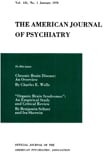A CRITICISM OF THE CONCEPT OF NEUROTIC DEPRESSION
Abstract
There appears to be a good deal of confusion in the literature as well as in psychiatric practice about depressive illness, which is a left-over from the era of descriptive psychiatry. Concepts of psychogenesis, endogeny, reactivity, neurosis, psychosis, and others had been introduced to clarify the issue through more specific characterization, however, without producing the desired result. Neither the course of the illness nor the therapeutic success of various procedures, nor the danger of suicide are consistently enough dependent on the factors mentioned to justify their continued use. The concept of considering a "neurotic" depressive reaction to be merely a milder condition than the psychotic variety only supports the view of those who look upon the differentiation of neurosis from psychosis as being superfluous and misleading. The danger of suicide is independent of the presence of overtly psychotic behavior and is likely to be overlooked by the inexperienced person who considers neurosis and suicide incompatible. Dynamic features in depressive illness do not show differentiating characteristics specific enough to permit the distinction between a neurotic and psychotic group. The apparently different response of various depressive reactions to electroshock therapy is more dependent on the relative prominence of depressive mood in the total picture than on the neurotic or psychotic nature of the condition. It is suggested that in evaluating depressive disorders more emphasis be put on suicidal dangers and problems of management rather than on adjectival characterization of "neurotic" or "psychotic."
Access content
To read the fulltext, please use one of the options below to sign in or purchase access.- Personal login
- Institutional Login
- Sign in via OpenAthens
- Register for access
-
Please login/register if you wish to pair your device and check access availability.
Not a subscriber?
PsychiatryOnline subscription options offer access to the DSM-5 library, books, journals, CME, and patient resources. This all-in-one virtual library provides psychiatrists and mental health professionals with key resources for diagnosis, treatment, research, and professional development.
Need more help? PsychiatryOnline Customer Service may be reached by emailing [email protected] or by calling 800-368-5777 (in the U.S.) or 703-907-7322 (outside the U.S.).



